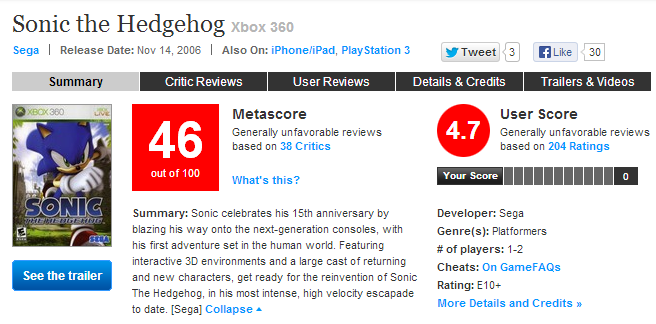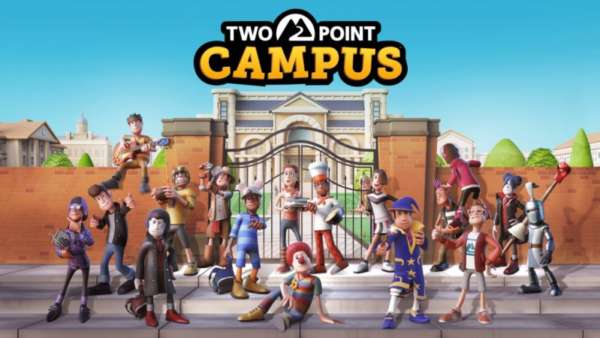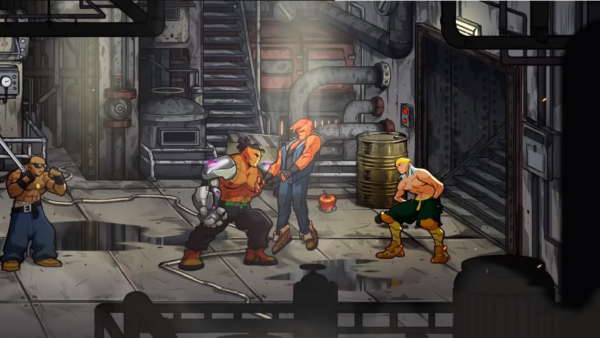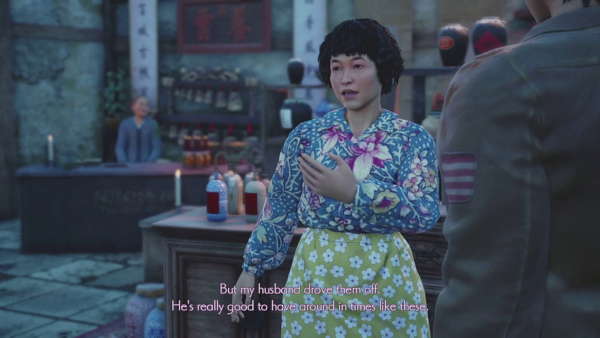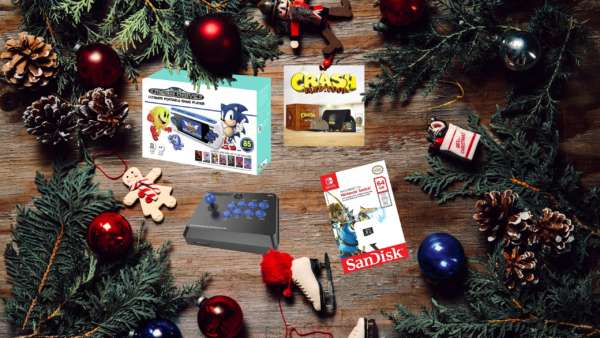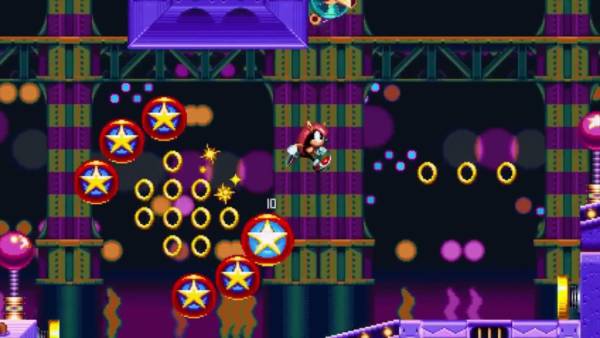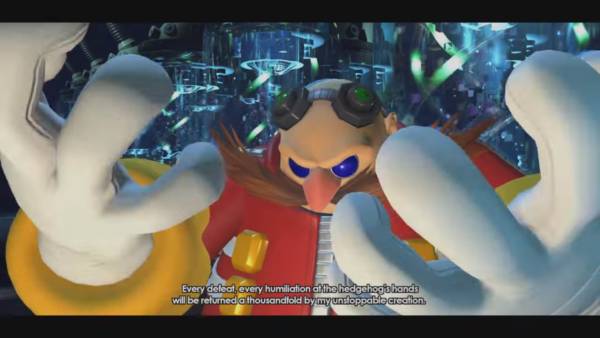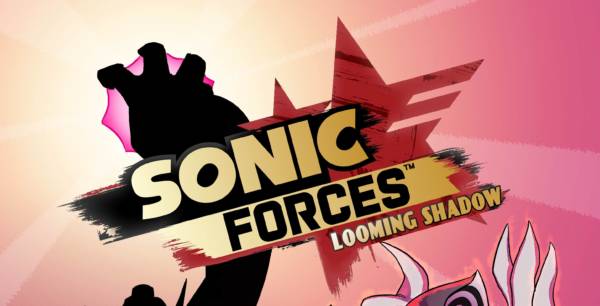There was a time, when every new Sonic game brought with it a wave of cynicism and lamentation over what many people believe was a lost cause. Some people believe that nothing’s changed. I’m here to try and prove to you that the cause is not lost – in fact it was regained long ago.
See the title? 2006-2009. It has an end date. If you think that Sonic is still in a rut, you’re sorely mistaken, as the series has been gaining momentum (heh) since 2010. But first we have to dial the clock back to uncover why this is important – all the way back to the 1990’s.
The classic Sonic games are untouchable. On Mega Drive/Genesis, Sonic Team delivered hit after hit, with every game knocking it out of the park, creating some of the all-time greats. The classic Sonic games are milestones in game design, with the levels affording a sense of momentum-based movement to a speedy character, thanks to a clever physics engine and curvy level design.
Entire childhoods were forged on the original series, which kept going through thick and thin, 2D & 3D, SEGA’s exit from the hardware business and beyond. Despite all these ups and downs, there wasn’t a single game that was universally regarded as terrible…yet. Unfortunately it all went nuclear in 2006.
Sonic the Hedgehog 2006 has become an internet phenomenon. When it was released, it became the news story of the decade: “the tragic fall of an icon”. Now, I’m not going to defend Sonic 06 – I think that’s impossible. But since then, people have flocked to Let’s Play videos of the game, be it out of sheer morbid curiosity, or some word-of-mouth encouragement. It’s gone viral, so to speak, and has become almost the videogame equivalent of The Room, which is totally unfair to the series and those who grew up with it. That sort of thing arguably hurts the series more than the game itself.
This is a perfectly justified score
Now, it’s not just Sonic 2006 that was released to negative reviews. There was a period between 2006 and 2009 where the series probably became a joke to most people, irredeemable in their eyes. During this Dark Age, “Rent-a-Trainwreck” might have fit as a description.
Somewhere between the Werehog with stretchy arms, the trip into Arthurian legend, or the utterly bizarre Bioware-developed RPG, the Sonic series took its well-publicised nosedive and promptly crashed. When reviewers trashed these games (arguably more than they should have – think 6’s instead of 4’s), their comment boxes incurred the wrath of some very angry fans. The franchise was almost dead.
It had become a meme; Sonic sucks by definition, and in order to appreciate it you must have some serious issues. Abhorrent articles comparing Sonic fans to abused housewives were published, for example. The meme was in full force, profoundly ingrained into the gaming sub-conscious, and stated thus: Sonic games simply couldn’t be good anymore, kept alive only by children who didn’t know any better, or by insane fanboys. The hive mind was already decided on anything Sonic related long before it came out – it was going to be a terrible game, and anyone who liked it was totally mental.
The Sonic Cycle, an image conjured in the foulest depths of the internet, emerged and became the go-to reference for judging Sonic games. After that disastrous “Black Knight” nonsense, all eyes were on the next main full-price Sonic game, which was finally released in late 2010.
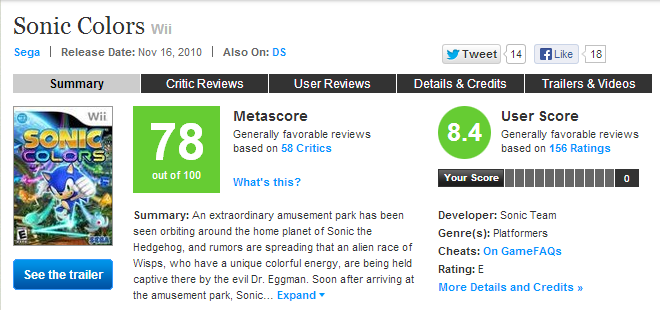
Taking Sonic out of the 4-year rut
If you can only go down once you reach the top, you can only go up when you reach the bottom. In 2010, Sonic Colors was released for the Wii. The game was a surprising treat, because it focused on design and mechanics rather than trying to create something too ambitious. The story was pure Saturday-morning cartoon fare, and gameplay was nice and simple, but above all else, it was consistent. Gone were the mandatory switches to a new game type – you were just platforming and running around a nice and silly world having a good time throughout.
The meme was disproven, but not dispelled. Of course, it would take more than one good game to shake off the previous few years.
By this point the year 2011 was rolling around – the 20th anniversary of the franchise. SEGA released Sonic Generations in November 2011, and represents the last big outing for the blue blur on consoles.
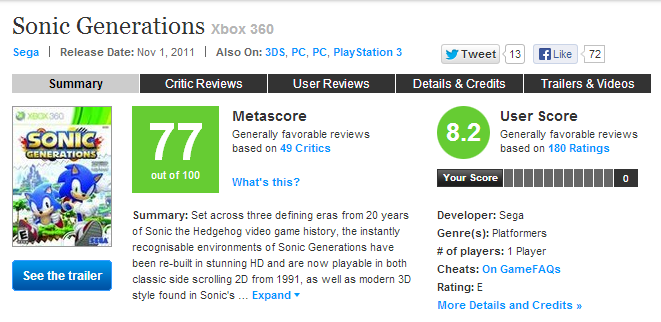
The game is in Metacritic’s green zone, which is a good thing
Why are people worried about Sonic Lost World again? This is not the same SEGA we knew in the latter half of the 2000’s – this should go some way to proving that the series is back on track. No editor on Metacritic saw fit to slate the last Sonic game, bringing an end to years of bad reviews. The game also finds itself on Steam sales frequently, so if you ever feel like checking it out, it’s highly recommended. Continuing where Colours left off, the game is simply a platformer – and a decent one at that.
It has been said that with Sonic, you need to proceed with caution, because the series is guilty until proven innocent.
If Metacritic is to be believed, it was proven innocent in 2010 and 2011. Looking ahead to Sonic Lost World then, we can probably expect another decent game from Sonic Team, safe in the knowledge that the bad times are over. It’s time to end this perception of Sonic – the games are good now, and our Gamescom preview of Sonic Lost World left us with a good impression.
Proven innocent, maybe, but proven brilliant? Perhaps one day we’ll see Sonic back in the 90’s…on Metacritic. These games are averaging in the high 70’s, which proves that they aren’t bad games by any means. Sonic’s on his way back up, but we still have yet to see a modern Sonic game fetch 9’s across the board. Here’s hoping Sonic Team can deliver.
I put it to you, dear reader, that Sonic simply doesn’t suck any more. Do you agree? Let us know what you think in the comments below.
